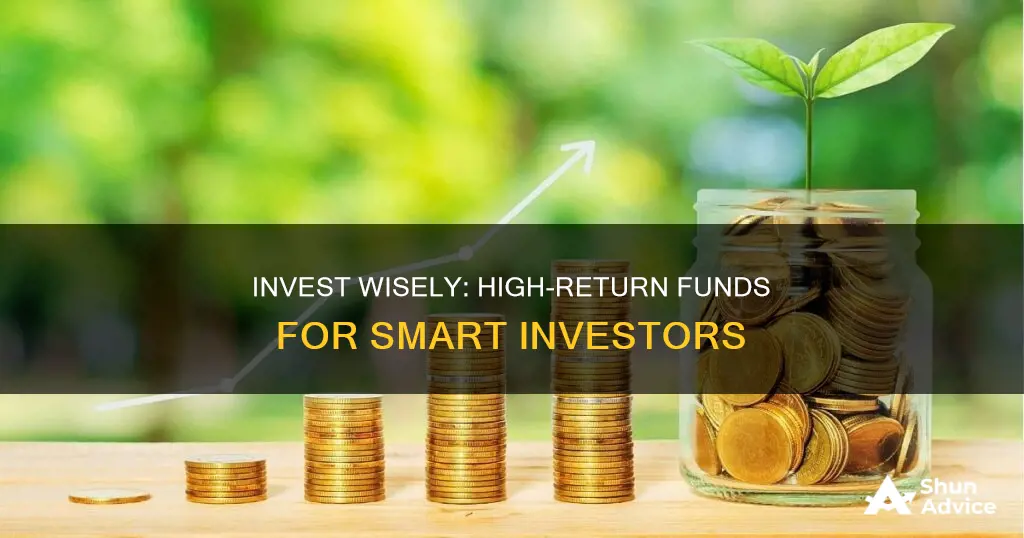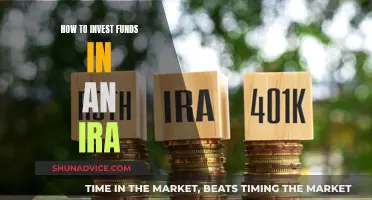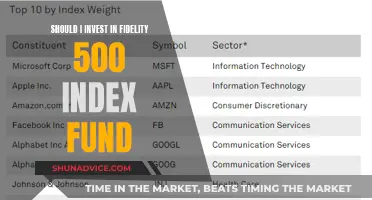
There are many ways to invest your money, from low-risk options such as CDs and money market accounts to higher-risk picks such as stock index funds. The best investment for you depends on your risk tolerance, timeline, and other factors. Here are some options for high-return investments:
- High-yield savings accounts: These accounts offer higher annual percentage yields (APY) than traditional savings accounts, making them ideal for short-term savings or emergency funds.
- Long-term certificates of deposit (CDs): CDs are issued by banks and offer a higher interest rate than savings accounts, making them a good choice for those seeking higher returns with lower risk.
- Long-term corporate bond funds: These funds can provide cash flow and reduce portfolio risk while offering higher yields than government bond funds.
- Dividend stock funds: Dividend stocks offer a cash payout, making them attractive for income-focused investors.
- Value stock funds: These funds invest in stocks that are bargain-priced compared to the market, offering the potential for attractive long-term returns.
- Small-cap stock funds: Investing in small-cap funds allows you to bet on the growth of smaller companies, which can lead to significant gains if they succeed.
- Real estate investment trusts (REITs): REITs offer high dividends and the potential for capital appreciation, making them a good option for those seeking income and growth.
- S&P 500 index funds: Investing in an S&P 500 index fund provides diversified exposure to some of the largest and most successful companies in the world, offering the potential for higher returns than traditional banking products.
- Nasdaq-100 index funds: These funds offer exposure to leading tech companies and the potential for high growth, but they also come with significant volatility.
- Rental housing: Investing in rental properties can generate regular cash flow, but it requires active management and comes with various risks and responsibilities.
| Characteristics | Values |
|---|---|
| Risk | The higher the risk, the higher the potential return. |
| Diversification | Diversification helps to balance your portfolio and hedge against losses. |
| Time horizon | The longer the time horizon, the higher the potential return. |
| Liquidity | Liquidity requirements vary depending on the investment type. |
| Regulation | Regulation and oversight vary depending on the investment type. |
| Historical performance | Historical performance is not a guarantee of future returns but can be indicative. |
| Fees and charges | Fees and charges vary depending on the investment type and provider. |
| Accessibility | Some investments have minimum investment requirements or eligibility criteria. |
| Tax implications | Tax implications vary depending on the investment type and jurisdiction. |
What You'll Learn

High-yield savings accounts
- APY: The annual percentage yield (APY) is the amount of interest you'll earn on your savings over one year. Look for a savings account with a competitive APY, ideally between 4.00% and 5.00%.
- Restrictions and limitations: Read the fine print to see if there are any restrictions on earning the advertised APY. For example, some accounts may have a minimum balance requirement or require you to set up direct deposits.
- Fees: Many high-yield savings accounts have no monthly fees, but it's important to check as any fees will reduce your interest earnings.
- Customer experience: Consider how easy it is to access your money and how quickly you can deposit and withdraw funds. Also, look at the customer service options offered by the bank or credit union.
- Digital banking: Many high-yield savings accounts are offered by online banks and fintech companies, which provide convenient online and mobile accessibility.
- M1 High-Yield Savings Account: Offers 4.50% APY on all balances, FDIC insurance up to $3.75 million, no minimum deposit or balance requirements, and a full suite of banking products. However, M1 charges a monthly fee of 4.50% APY to users with less than $10,000 in assets, unless they have an active personal loan with the company.
- Bask Interest Savings Account: Offers 4.85% APY on all balances, no monthly fees or minimum deposit/balance requirements, interest compounds daily, and customer support is available via phone and email. However, there is no live chat support or in-person branches.
- UFB Portfolio Savings: Offers up to 4.57% APY on all balance tiers, no minimum balance or deposit requirements, interest compounds daily, and includes a free ATM card. However, there is a limit of six certain types of withdrawals per month, after which a $10 fee is charged for excess transactions.
- Salem Five Direct eOne Savings: Offers 4.50% APY for deposits up to $1 million, no minimum balance or monthly fees, and a low opening deposit requirement of $10. However, the account is only open to new customers or existing customers with a Salem Five Direct eOne Checking account, and branch access is limited to the Boston area.
- BMO Alto Online Savings Account: Offers 4.60% APY on any balance, unlimited transfers and withdrawals with no fees or minimums, and an online platform for banking. However, BMO Alto doesn't offer an app, checks, or debit cards, and there are limited ways to fund your account.
Remember that interest rates can change, so it's important to shop around for the best rates and choose an account that fits your financial goals and needs.
Retirement Planning: Safely Investing for Peace of Mind
You may want to see also

Long-term certificates of deposit
When you open a CD, you agree to keep your funds deposited for a fixed period, known as the term, which can range from 30 days to 10 years. During this time, your money earns interest, and you cannot access it without incurring an early withdrawal penalty. The longer the term, the higher the interest rate you can expect. This makes CDs a good option if you want to save for a specific goal, such as a new home or a car, or if you want to invest conservatively with lower risk and volatility.
It's important to note that CDs have a fixed interest rate, so if the federal funds rate increases during the term of your CD, you may miss out on higher returns. However, if you expect rates to decrease, locking in your money in a long-term CD can be advantageous.
When choosing a CD, consider factors such as the interest rate, term length, minimum deposit, fees, and bump-up options. Additionally, look for federally insured CDs to ensure the security of your investment.
Overall, long-term CDs are a safe and reliable investment option, offering higher returns than traditional savings accounts while providing federal deposit insurance for added security.
Smart Money: Ultra-Short Term Funds Explained
You may want to see also

Long-term corporate bond funds
Corporate bond funds offer investors the opportunity to earn higher returns than government and municipal bond funds. The trade-off is that they carry more credit risk. To mitigate this risk, it is important to invest in high-quality corporate bonds and diversify your portfolio across many different companies.
When considering investing in long-term corporate bond funds, it is essential to understand the risks involved. While these funds can provide higher returns, there is always the chance that the companies issuing the bonds may have their credit rating downgraded or encounter financial difficulties, potentially defaulting on the bonds. Therefore, it is crucial to conduct thorough research and due diligence before investing.
Some popular long-term corporate bond funds include:
- SPDR® Portfolio Long Term Corp Bd ETF
- IShares 10+ Year Invmt Grd Corp Bd ETF
- Vanguard Long-Term Corporate Bd ETF
- Invesco Taxable Municipal Bond ETF
- IShares Core 10+ Year USD Bond ETF
- FlexShares Crdt-Scrd US Lng Corp Bd ETF
By investing in long-term corporate bond funds, investors can benefit from higher returns while managing their overall portfolio risk. It is a suitable option for those seeking cash flow, such as retirees, or investors who want to balance risk and return effectively.
Mutual Funds: Investors Seek Diversification and Professional Management
You may want to see also

Dividend stock funds
When investing in dividend stock funds, it is important to be aware of the tax implications. Dividend income is taxed if the shares are held in taxable brokerage accounts. To avoid this, investors can hold the shares in a tax-advantaged account like a traditional or Roth IRA.
Additionally, it is important to remember that dividends are not guaranteed. Companies may cut or eliminate dividends due to financial difficulties. Therefore, it is crucial to research and carefully evaluate dividend-paying stocks before investing.
Vanguard Funds: Exploring India-Centric Investment Opportunities
You may want to see also

Value stock funds
Value stocks tend to perform better when interest rates are rising, as this makes growth stocks less attractive by comparison. Many value stock funds also pay dividends, which is an additional attraction for many investors.
There are two main types of value stock funds: ETFs (exchange-traded funds) and mutual funds. ETFs are usually available commission-free and without a minimum purchase requirement at most major online brokers. On the other hand, mutual funds may require a minimum purchase and may charge a commission.
- Vanguard Value ETF (VTV)
- IShares Russell 1000 Value ETF (IWD)
- Vanguard Small-Cap Value ETF (VBR)
- Vanguard Mid-Cap Value ETF (VOE)
- Fidelity High Dividend ETF (FDVV)
- SPDR Russell 1000 Yield Focus ETF (ONEY)
- Vanguard Equity Income Fund
- Vanguard Windsor II Fund
- ClearBridge Large Cap Value Fund
Smart Strategies for Investing $200K in Mutual Funds
You may want to see also
Frequently asked questions
Some high-return investment options include:
- High-yield savings accounts
- Long-term certificates of deposit
- Long-term corporate bond funds
- Dividend stock funds
- Value stock funds
- Small-cap stock funds
- Real estate investment trusts (REITs)
- S&P 500 index funds
- Nasdaq-100 index funds
- Rental housing
Some high-return, high-risk investments include:
- Options
- Initial public offerings (IPOs)
- Foreign emerging markets
- Real estate investment trusts (REITs)
- High-yield bonds
- Currencies
- Penny stocks
- Cryptocurrency
- Individual stocks
- Venture capital or angel investing
- Real estate
Some low-risk investments with high returns include:
- High-yield savings accounts
- Money market accounts
- Certificates of deposit (CDs)
- Series I bonds
- Treasury securities
- Municipal bonds
- Dividend stocks
- Money market funds
When investing, it's important to consider your risk tolerance, timeline, knowledge of investing, financial situation, and how much you can invest. It's also crucial to remember that there is no guaranteed way to double your money, and that all investments carry some degree of risk.







